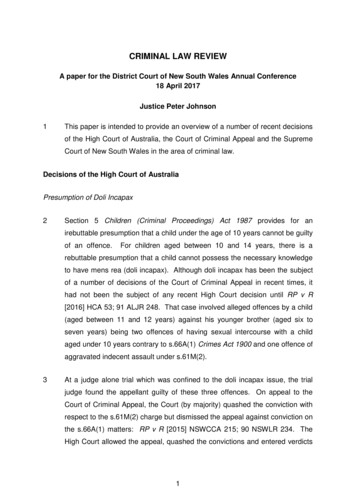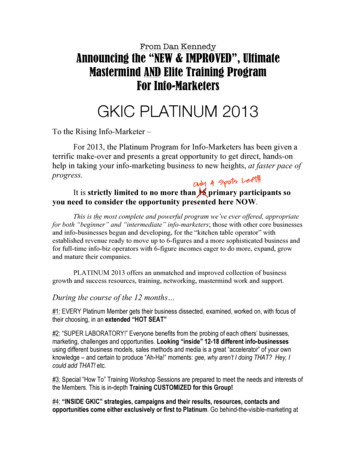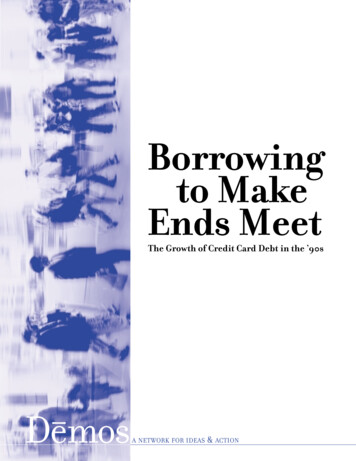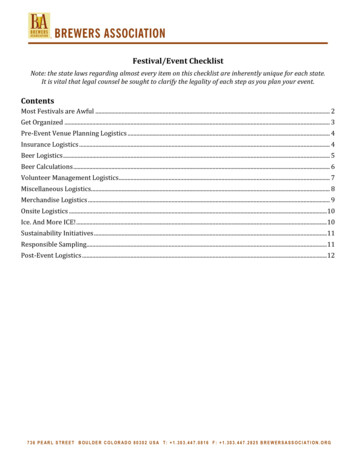
Transcription
HOW FILMTO SETFESTIVALUP AHow to set up a Film Festival
How to setup a FilmFestivalHow to Set Up a Film Festival has been written in response tothe increasing number of film festivals being set up in the UK.It is not exhaustive but is intended to provide a broadframework for planning and to guide you through some of thequestions you need to consider when starting out.Edited by Pippa Eldridge and Julia VossContentsMany people contributed in different ways toHow to Set up a Film Festival and the editorsare extremely grateful to them all. In particularwe would like to mention the following:Simon Allen/bfi, François Ballay/European Coordination of Film Festivals, Cary Bazalgette/bfi,Richard Boyd/bfi, Paul Brett/bfi, Stephen Brown/Steam, Anna Butler/bfi, Chris Chandler/FilmCouncil, Rose Deenah/bfi, Jo Denham/bfi, HelenDe Witt/bfi, Catharine Des Forges/bfi, Chris Fell/Leeds International Film Festival, Ann Griffiths/bfi,Briony Hanson/Script Factory, Sandra Hebron/London Film Festival and London Lesbian and GayFilm Festival, Sue Howard/Ripon Film Festival,Andrew Kelly/ Bristol Cultural DevelopmentPartnership, Bill Lawrence/ National Museum ofPhotography Film and Television, Bradford,Jonathan Morris/bfi, Cathy Poole, Bristol BriefEncounters Film Festival, Charles Rubenstein/Turkish Film Festival, Lottie Wake/bfi, KeithWelch/bfi, Jo Wingate, ¡Viva! Spanish Film Festival.The editors have made every effort to ensurethat information in this guide is accurate and upto date. If there are any schemes, projects oromissions which you wish to be considered forinclusion in the next edition, please contact theExhibition Development Unit on 020 7815 1419.Getting started1Organisation and Constitution2Partnerships4Programme5Operational Issues8Technical Considerations12Education and Special Events14Press and Marketing15Access18Budgeting and Cash Flow19Raising finance21Evaluation25Useful contacts26Useful publications28Useful websites28Appendices29Copies of the bfi’s How to Set up a Film Festivalare available on the bfi’s website and from thebfi Exhibition Development Unit, Regional ArtsBoards, Media Development Agencies andnational film bodies.ISBN: 0 85170 836 6 Copyright bfiCover photo:Run Lola Run Leeds International Film Festival
HOW FILMTO SETFESTIVALUP AThe UK is overflowing with film festivals! Whereas a decade ago there was astrictly limited number of long-established events marking the seasons of eachyear, it now seems that every week a new film festival springsup somewhere in Britain. In an overcrowded marketplaceyou need to ask yourself three basic questions:1. Why a film festival?Would a film seasonor film society bemore appropriate?Limited amount of both private andpublic funding Competition for audiences from otherestablished festivalsMost people will not travel long distancesto go to see films except in the case of thevery large or specialist film festivals, sothe issue of competition for audiences maybe less critical than competition for filmprints from distributors.Well established festivals always getfirst choice on titles as distributorsor sales agents will be confident thatthe film is going to be seen by a largenumber of people.If, having thought about the above issuesyou are still determined to proceed,matters such as deciding a date for yourfestival and funding are covered furtheron in this guide.FOR?In a climate of so many competingfestivals funders are unlikely to back afestival if they perceive it to be similar toanother event. This is mainly due to limitedresources and a need to balance provision. IT1 Film distribution difficultiesISDoes your area need a specialist festival tobroaden the range of films for certain keyaudience groups for example, Asianaudiences? Or does your area simply nothave access to any kind of film provisionso that your audience would be happy togo and see films covering a wide range offilm genres?Duplication is likely to damage your abilityto run a successful festival for thefollowing reasons: WHO2. What kind of festivalmight be appropriateand who is it for?Originality is sometimes a difficult qualityto define but fundamentally, you do notwant to do something that someone else isdoing in your area or has done in therecent past. The useful contacts andfurther information section should helpwith getting a broader picture of what ison offer. Festival listings are published byScreen International and the BritishCouncil.ANDIf you are starting from scratch you maywell want to test the water with a seasonof films to assess the audience potentialrather than going for a full scale festivalevent at the outset. If you want to givepeople in your area access to a broadrange of films on a more regular basis, youmay wish to investigate the possibility ofestablishing a film society. In this case, youshould contact the British Federation ofFilm Societies (BFFS) for help and advice.(see useful contacts)3. Is my festivaloriginal?WHY A FILM FESTIVAL?WHAT KIND OF FILM FESTIVALIS MY FESTIVAL ORIGINAL?Getting Started1. 2. 3.
HOW FILMTO SETFESTIVALUP AOrganisation andConstitutionDo you need a formalstructure?Setting up a LimitedCompanyMany film festivals operate as unincorporatedassociations i.e. an informal group ofpeople who come together to set up andrun a festival. They undertake all activitiesas private individuals, applying for grantsand entering into contracts in their ownnames. For most purposes, particularly fora new festival this is probably asatisfactory way forward and you may notneed to consider incorporation as acompany until such time as the festival isproperly established. Informal associationscan still benefit from the drawing up of aconstitution that outlines their mainobjectives and the way in which businesswill be conducted. When selecting peopleto be on your steering group, board ofdirectors or trustees, make sure you get agood mix of specialist skills. Marketing andfinance are the two areas where it issometimes difficult to find people andthese areas are critical to the success ofyour festival.Registering as a company can offeradvantages although this has to bebalanced against some of the costs. To doso creates a legal separation betweenpersonal and business finances, limitsliability in the case of financial (and other)disasters, can give credibility to onesactivities and can be used to regulaterelations within partnerships in a corporaterather than personal capacity. In general,the larger the project you intend toembark upon, the larger the amounts ofmoney you will need to complete it, themore useful it becomes to operate as alimited company. If you are entering intocontracts or agreements with organisationssuch as public sector funders, distributors,banks and so on, being a registered companycan give you not only credibility but alsosome additional protection against error orsharp practice. Most particularly, it is thecompany, not you personally, which mustfulfil contracts or meet liabilities: as longas company directors have acted properlyand responsibly, your liability for financialand other penalties can be limited. It isalso worth noting that most NationalLottery distributors and some otherfunders do not make grants to individuals.2Psycho Leeds International Film FestivalIt may also be worth thinking aboutregistering as a charity at some point.Charitable registration is open to bothconstituted companies (limited byguarantee, see below) and unconstitutedorganisations. Both charity and companyregistration can be expensive and timeconsuming and it can be problematic if youwish to dissolve your organisation in thefuture, so careful consideration should begiven to the need to register.The Companies Act 1985 lays down strictregulations governing what companiesmay and may not do. The Act is enforcedand monitored by Companies House. Itimposes reporting and operatingrestrictions which some individuals orgroups may regard as onerous. Much ofthis is to do with the frequency andadministration of company meetings, thefiling of annual results and auditing ofaccounts. Failure to file the appropriatereturns and accounts on the due dates canlead to quite substantial fines.
HOW FILMTO SETFESTIVALUP ACONSTITUTION/RULESSTRUCTURESKILLSIf you think a limited company structuremight be an advantage, the first thing todo is contact Companies House for itsguidance notes on incorporation andregistration and read them thoroughly.These are invaluable: without them you willinvariably get something wrong. Only forma company if you are certain that it is thebest option for you and you are confident inthe people you wish to work with. A companymust have at least two directors - you cannotform one as an individual. If in doubt, seekadvice from a solicitor, company formationagent or similar professional.As to the actual process of creating acompany, there is a standard registrationfee (currently 20). However, you may alsoneed professional help to draw up yourMemorandum and Articles of Associationwhich give details of the company, itsactivities and how it will operate as a legalentity. Companies House takes all of thisvery seriously, even to the extent ofrestricting the use of certain words incompany names. To all intents andpurposes there are two options for thesort of company you might form: limitedby guarantee or limited by shares. Tosimplify greatly, a company limited byshares would have the objective of tradingin order to make profits to distribute to itsshareholders. A company limited byguarantee is the format available tocharities and other groups which do notseek to distribute any profits to companymembers.3Forming a CharityOperating as a charity can bring benefitsto an organisation and may assist withfundraising. Charities enjoy corporationtax and council tax benefits and charitablestatus can bring credibility in the eyes offunders, other organisations and thegeneral public. It can also be easier toraise funds from certain sources includinggrant-making trusts and local government.While the Charities Act 1992 restricts thefreedom which charities have to tradebeyond the strict remit of their charitableobjectives, lost flexibility can be restoredby the creation of a trading companyoperating outside the scope of charity lawbut covenanting profits back to the charity.The legislation governing theestablishment and activities of charities is,however, as stringent as that governinglimited companies. The CharityCommissioners maintain a register,investigate misconduct and abuse, andotherwise administer the charities sectorin England and Wales. The law is differentin Scotland. There are separate rulesgoverning the published annual accountsproduced by charities known as SORP(Statement of Recommended Practice) andit can be costly to employ a specialistaccountant to draw these up.Under law, charities exist to fulfil aspecified purpose and are, by definition,voluntary organisations: that is, the boardof management must not be remunerated(although staff can be paid). The definitionof charitable purpose breaks down into sixheads of charity: the relief of the elderly,vulnerable or hardship; the advancementof education; the advancement of religion;the promotion of urban or ruralregeneration; the relief of unemployment;other charitable purposes for the benefitof the community. Most charities active inthe arts or media operate under theeducational head.It is also illegal for the trustees of acharity to benefit from it financially - forexample, a trustee cannot also be anemployee of the charity. It is possible to beprosecuted for running a charityimproperly.The Charity Commissioners publish abooklet, So You Want to Start a Charity?,which gives advice and explains the law.There are more than 150,000 registeredcharities already operating and it may bepossible - or even desirable - to join forceswith an existing organisation. The CentralRegister of Charities (which can beconsulted at Charity Commission offices)or Charities Digest both give informationon existing charities.
American Movie Sheffield International Documentary Film FestivalHOW FILMTO SETFESTIVALUP APartnershipsPICK YOUR PARTNERS WITHCARE AND IMAGINATIONIDENTIFY MUTUAL BENEFITS1 1 1 1 10!Partnership has become something of abuzz word in recent years. In theory,developing partnerships should lead tosynergies i.e. the whole is greater than thesum of its parts. Most successful filmfestivals are a complex network ofcollaborations and contributions but theserequire careful management if they are tobe sustained over time and yield benefitsto both parties. The potential benefits ofpartnerships are that they :4 add credibility to your festival provide information and advice or skillsabsent from your management team inform your programming andmarketing activity can provide in kind support (speakersor workshop leaders for example) can help you access particularniche audiences occasionally lead to sponsorshipThere are many types of partners that maybe relevant to your festival. The followinglist is not comprehensive but should giveyou some ideas:Cultural Institutes (especially if you areprogramming foreign language films)e.g. Instituto Cervantes, Goethe Instituteor Institute Français; venues; educationalbodies/establishments; community andvoluntary sector organisations (especiallyspecial and minority interest groups);campaigning groups; charities; film societies;local authorities; health authorities; localbusinesses; international businesses; artsdevelopment agencies; media developmentagencies; other arts organisations (forpotential cross-artform collaborations inparticular new media and music); artsmarketing agencies; film archives; film andvideo production agencies/workshops;training agencies; screen commissions;funding bodies; press (national/local);broadcasters; webcasters; narrowcasters;retailers (books, films, restaurants).Partnership is a two way process and youwill need to establish what the potentialbenefits to both parties are before youmake contact. The impo
HOW TO SET UP A FILM FESTIVAL 1 The UK is overflowing with film festivals! Whereas a decade ago there was a strictly limited number of long-established events marking the seasons of each











